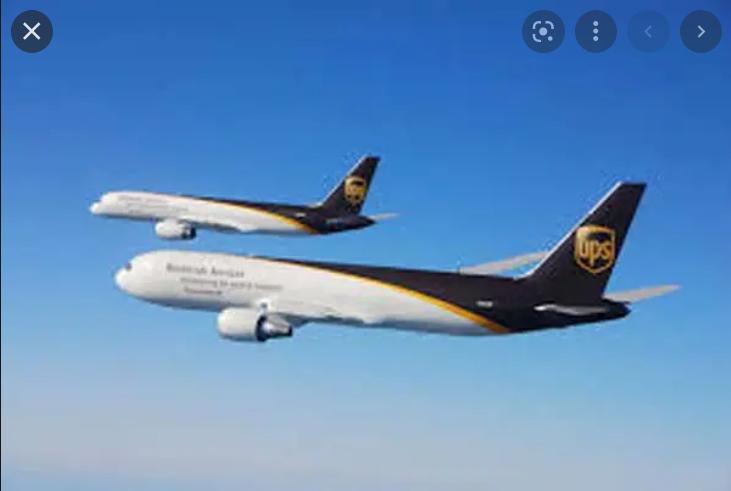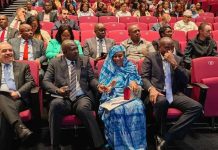Africa-Press – Gambia. The present arguments by AON based on BASA principle and the recent call by the National Assembly Committees on Aviation for BASA review are now largely a waste of time and energy and will most unlikely have any positive outcome. Why? Details below!
Airline Operators of Nigeria – AON is an Aviation industry pressure group whose status emanate from the fact that its members constitute, not just the mainstay of the industry, but also the sustenance and drivers of the sector, a sector that is a fulcrum on which many aspects of the economy revolve.In the industry, Airline Operators should collectively have a voice that should never be ignored in policy, plan and vision for the development and growth of the sector. This is predicated on the fact that, not only being airline operators, their exposure and knowledge put them ahead of the generality of other stakeholders, particularly in the airline subsector. But this status diminishes when there are gaps in knowledge.For almost two decades, up to 2010, the AON was the most formidable voice in the industry. The duo of Dr. Steve Mahonwu and Capt. Mohammed Joji, (Chairman and Secretary-General of AON respectively), with vast experience in the industry provided interventions of general and common interests for airline operators and the industry. They focused on policies and actions of the government and its agencies that clogged the industry’s wheel of progress.AON not only attracted respect but also engendered some fear in the minds of principal and political officers to the extent that one Minister called AON, a “pain in the ass”. Mahonwu and Joji-led AON were a restraint on political and public service actors who sought to act on not too well thought out policies and plans in the industry. Both of them sought and had facts in their hands with which they confronted and challenged misdemeanours. One could disagree with their analyses but their facts stood the hard test of factuality.
By 2010, resolute challenge from AON had become such that the then Aviation Minister decided to apply a political master stroke that ended the existence of a strong AON. Unfortunately, some members of the then AON for various personal motives offered themselves as accessories to the plan and unwittingly offered the head of AON to the Minister on a platter, like the head of John the Baptist to Herodias. Having taken out Mahonwu and Joji, which was the objective, the new AON that emerged had no baton, no history to take over. Peopled by new younger operators without pedigree and exposure to global, regional and domestic aeropolitics, its voice became very weak with very limited respect in the industry and consequently, very limited impact.The eleven-year period, 2010-2021, of a very weak AON has created a chasm in knowledge due non-exposure to global aviation conferences and forums as IATA, AFRAA, AFCAC and ICAO where global and regional aviation policies are canvassed and developed. Today, because of the accepted role of aviation in global, regional and domestic economies in a globalised world, the World Bank/IFC, WTO, African Union (AU), AfDB and Afreximbank and Economic commission for Africa (ECA) have all become much involved in the sector.
This reality and more importantly the role of AFRAA as the Continental Representative body and voice of African Airlines globally seem for many years not to have been within the mental horizon of our domestic operators due various reasons.In fact, one of the major operators once showed his lack of understanding when in response to a journalist who inquired why his airline had not joined AFRAA, said “what do I need AFRAA for? It is just a trade Association like AON. I am a member of AON, so I don’t need AFRAA.” This response is a clear evidence simpliciter of lack of knowledge of the primacy of AFRAA at its extreme. AON is only known in Nigeria by aviation stakeholders and is no longer regarded as the voice of the airline subsector with the credibility it used to have in the era of Dr. Mahonwu.
AFRAA, established in 1968 is a Continental Association recognised globally by United Nations, ECA, ICAO, IATA, WTO, African Union (AU), AfDB, World Bank/IFC and others. In these Organizations, it represents and speaks for African Airlines. AFRA played and will continue to play a major role in the emergence of the Yamoussoukro Decision. YD, the basis of SAATM – Single African Air Transport Market (Open Skies). AFRAA is the brewing factory of airline policy and practice in Africa. It is where the African airline “big boys” – Ethiopian Airline, Egypt Air, South African Airways, Kenya Airways, Royal Air Maroc and others play. It is noteworthy that about three of our domestic airlines – Air Peace, Overland Airways and Allied Air Cargo have joined AFRAA. But it is one thing to join and another to participate actively. Participation is not just attending the Annual General Assembly. Rather, it is a total involvement in various technical committees and the Executive Committee, all of which constitute the engine rooms of policy and policy implementation. Granted that all the domestic airlines operating today except Aero were not in existence when on July 12, 1999 – forty-four (44), African Heads of States and Government endorsed the Yamoussoukro Decision (YD) and when it became binding in 2002, with the right attitude, enough knowledge would have been acquired to guide the interventions of AON in regional and global aeropolitics as well as their positions on domestic issues in the industry.While some records of the deliberations of AFRAA Annual General Assembly (AGA) hosted by Nigeria Airways in 1990 in Abuja as well as the records of the last AGA attended by Nigeria Airways staff in Libreville in 2002 are still available, Nick Fadugba, the best-known Nigerian Aviation Consultant/Publisher was in the last decade, briefly AFRAA Secretary-General.
In all the AGAs, YD was extensively discussed and canvassed. All the archival documents and personal interactions would have informed interventions of AON of today.
I took the step of this background in order to properly situate two of the three current issues that AON has shown vociferous concern in the industry. These are:
1. Demand for Review of Nigeria’s Bilateral Air Service Agreements – BASA;
2. Multiple Entry Points to Foreign Airlines;
3. US$2billion Deposit Conditionality for would-be Foreign Technical Equity Partner for the proposed Nigeria National Flag Carrier – Nigeria Air.
Bilateral Air Services Agreement – BASA is an agreement between two sovereign nations for the sole purpose of conducting operation of airline services for passenger and cargo between them. In BASA, each of the two contracting states designate the Airline(s) that will operate the BASA rights along the Freedoms allowed.
BASAs are usually “innocent” and not commercial. They only designate airlines, state number of frequencies and Freedoms allowed.
The next and major step is the Commercial Agreement which the designated airlines negotiate and enter into in total genuflexion to the BASA terms and based on the principle of reciprocity absolute. What is referred to in airline operations as BASA Royalties emanate from Commercial Agreements. In principle, BASAs are usually restrictive in terms of capacity, frequency and other modus operandi. The concept and practice of BASA emerged in the immediate post-World War II at the Chicago Convention of December 1944. For almost five decades up to 1990, BASA remained the indisputable guide to international airline operations. Nations of Asia that considered unfavourable the BASA terms between them and United States in the early post-WWII years when they had no airlines to reciprocate made fruitless attempts to renegotiate them. They then focused their efforts in growing formidable airlines. Over the years, the emergence of Garuda Indonesia, Singapore Airlines, Malaysian Airlines, Al-Nippon, Korean Airlines, all of which today provide competitive services into US have as it were resolved the imbalance.
From the early 1990s, a new global movement began which resulted in a major paradigm shift that pushed BASA to the back seat. This movement that started in the United States developed, canvassed and sold the new concept of Plurilateralism, then Multilateralism and finally Open Skies. So many world conferences held in Chicago, Atlanta, Sweden and indeed Mauritius, Cairo and Lome. All these were focused on the liberalisation of air transport market tagged “Open Skies Ministerial” in the USA, “Europe 2000” in EU and YD in Africa. Nations, either single-handedly like US or in blocs like EU and Africa pursued Air Services Agreements along the new paradigms tearing away from the classic BASA. With constant rise in passenger traffic across the globe, market-by-market, bilateral-by-bilateral platforms were considered inadequate to cope with the trend.
By 1999, along this shift, the US concluded Open Skies Agreement with Burkina Faso, Namibia, Ghana and Gambia while discussion was going on with Tanzania. By 2000, US opened up Open Skies discussions with Nigeria which was consummated in 2001. Also, by the year 2000, Europe had become a single air transport market, making countries of EU together a domestic market for EU airlines, thus ending the age-long BASA regime.
In Africa, the YD conceived at the beginning of 1988 was signed by 44 African Heads of State and Government in July 12, 1999 during the AU Assembly held in Lome, Togo. After ratification in July 2000, it became binding in 2002 at the AU Assembly held in Cairo. YD was Africa’s response to Liberalisation of air transport within the region. Although AU Assembly of Governments charged the African Civil Aviation Commission – AFCAC as the implementing Agency, many signatory nations were groggy and hesitant in implementing YD. Determined to ensure air transport liberalisation in Africa, the AU Ministers in charge of Transportation initiated the Single African Air Transport Market – SAATM in February, 2015. Thirty-three (33) AU States signed the Document which was meant to drive YD implementation and make the entire Africa a domestic air transport market for African Airlines. Nigeria’s then-Minister of Aviation – Osita Chidoka signed for Nigeria. SAATM was then launched on 28th January, 2018 at the 30th Ordinary Session of AU Assembly held at Addis Ababa.
Today, SAATM has been positioned as the first of the twelve-drive head for the achievement of African unification Agenda tagged “African Continental Free Trade Area – AfCFTA between 2050 – 2063.
The clear revelation from the global paradigm shifts and scenarios above is that BASA is vanishing and no longer relevant as a platform for Air Services operation. With the emergence of Plurilateralism – PASA, Multilateralism – MASA and Open Skies, Bilateralism has become a grandfather. The frontline has since shifted.
So, the present arguments by AON based on BASA principle and the recent call by the National Assembly Committees on Aviation for BASA review are now largely a waste of time and energy and will most unlikely have any positive outcome.
Instead of continuing on this fruitless route, our Airlines should reinforce their presence and participation in AFRAA as it is most likely that in the next few years, Africa, like other Regions will negotiate Air Services Agreement as a bloc. It may not be far-fetched to imagine that even before 2050, the world would become a global domestic market for air transport. This will be the acme of globalisation. Both Nigeria and the airline subsector and indeed the Aviation sector should envision themselves in the field of domestic global market.
This will enable us avoid remaining permanently behind the Frontline.
Next week, I will look at AON’s complaints of multiple entry points by foreign airlines and its attempt to prescribe terms for would-be airline technical partners for the proposed of national flag carrier – Nigeria Air.
For More News And Analysis About Gambia Follow Africa-Press






